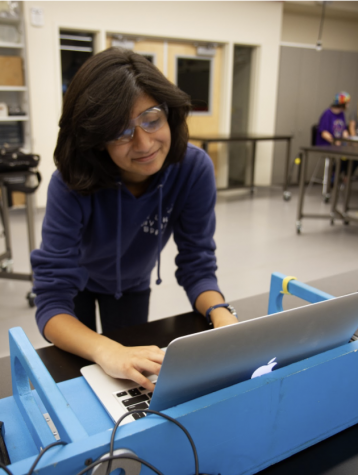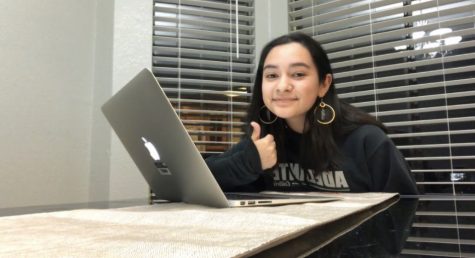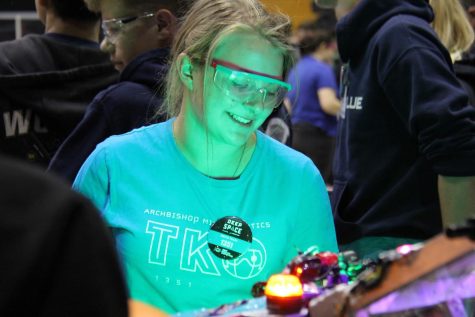Mitty Robotics Hosts Women in Stem Panel
A behind the scenes look at TKO’s Women in Stem panel and the robotics student leaders who made it happen.
Late last year Mitty’s robotics team held a Women in STEM panel to address the issues of gender and bias in STEM. This student-led panel was organized by team co-president Natasha Lal, senior; team secretary Maria Korolik, senior; and team Outreach lead Maria Reyes Plancarte, junior. Prompted by the gender disparity within their own team, these organizers hoped to spark interest in STEM for women both inside and outside the Mitty community.

Asked why the robotics team held this event, Lal responded, “We decided we wanted to focus a lot more on gender inequality because a lot of girls in our team felt that inequality in STEM was a really big issue… We definitely have gotten a lot more girls over the past few years, but it has never really been fifty-fifty.” She continued, “We just wanted to make sure that we had a more welcoming environment for girls on the team, help girls in our community become more interested in STEM, and try to further raise awareness about the issues women in STEM face.”
Lal herself had attended a similar panel by the robotics team as a freshman, and “thought it was really helpful.” She hopes that it “can be more of a tradition to have those panels.” But while there were similar panels at Mitty in previous years, many were more focused on women in engineering rather than on STEM as a whole. As Maria Reyes explains, this year they wanted “to focus on the experiences of women across all of STEM—not just engineering.”
This broadening of focus was not without complications. In order to make sure that they would have enough panelists from many different fields of STEM, Reyes explained, “We emailed more than ten people… beginning in the last week of October and continuing until Thanksgiving break.” Lal added that “even though everyone is usually pretty interested, sometimes it just doesn’t work out. We had to reach out to a lot of different people to see who fit best with our panel and what we wanted to do.” In addition to all the emails, they also went to the lengths of “pre-interviewing” each of the panelists to know what they wished to speak about. Korolik explained they wanted to ensure that “all five panelists could speak and get their point across,” building on their intent to include a diverse range of occupations.
Beyond the difficulties they faced with organizing the event, Natasha also worried about attendance. She explained, “One fear we had was that people might not want to show up because, with this new online platform, there’s a lot less motivation to go to events. Even if you put in the same time and effort as you would with an event in the theater, people are a lot less likely to come.”

After they were contacted and confirmed by the event organizers, the five panelists were announced to be Annie Zhang (class of ’15), an iPad Product Design Engineer at Apple; Graciela Marez (class of ’15), a QC Analyst at Visby Medical (a COVID-19 diagnostic company); Kate Smith, who previously worked at a biomedical firm for DNA analysis; Claire Barry, who works at Google Analytics; and Lama Nachman, the Director of Anticipatory Computing Lab in Intel Labs. These panelists represented a variety of different aspects of STEM. For instance, “for Annie and Claire,” Natasha stated, “we wanted to make sure to direct a lot of ‘intersections between art and STEM’ questions at them. And then with Graciela, we wanted to direct a lot of current applications—a lot of COVID questions— at her” because of their corresponding fields.
The topics these panelists spoke about seemed to parallel the experiences of each of the event organizers themselves. Korolik reflected, “One of the panelists, Annie, talked about the fact that, in general, females can be pressured into acting more meekly in their communications… I definitely know that I’ve done that a lot…That’s something that I’ve tried to keep track of more since then.”
Lal related to the panelists as well: “Lama Nachman said that a lot of the times when you try to stand up for yourself, there are going to be people who are very adamantly against you and very openly don’t want to change their mindset…Over time, you see that the people who are very adamant or who didn’t want to recognize sexism realize that they are the odd ones out.”

And regarding Lal’s concern about online attendance? Lal reports, “We still got somewhere between sixty and eighty people to show up.” She concludes, “I was proud of the fact that even though everything was online, we still got a lot of really interested people to attend, and we were able to get five engaging panelists to come to the event… The fact that it went smoothly, and we were able to teach people—I was just very proud of that.”


